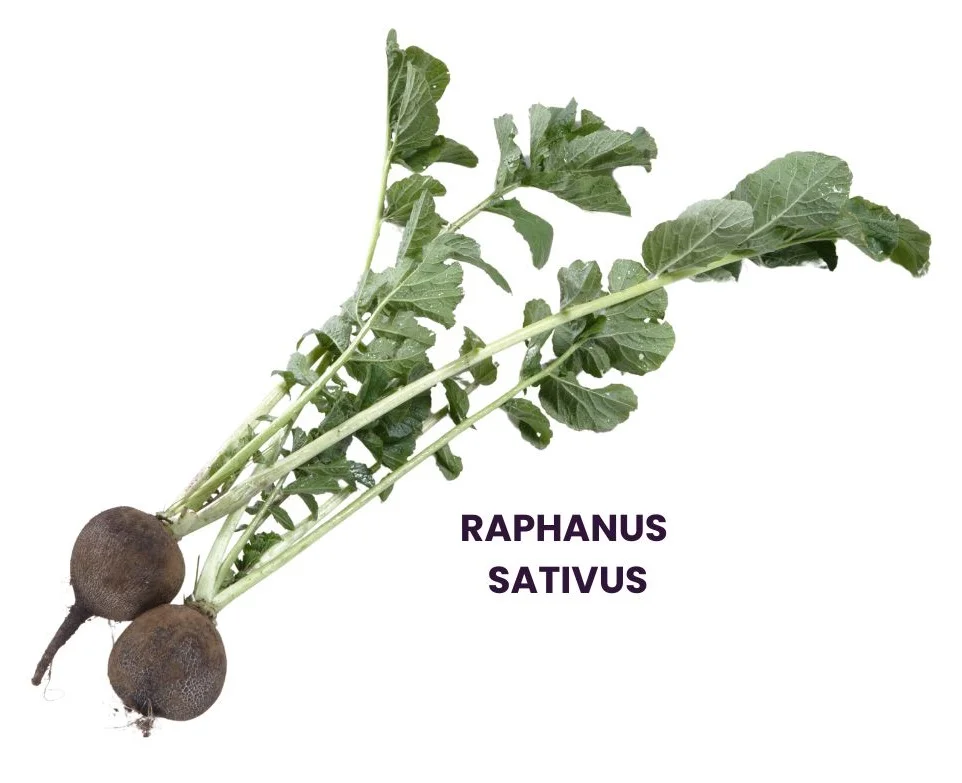Raphanus Sativus, commonly known as Black Garden Radish, is a plant from the Brassicaceae family.
It is used in homeopathy for its effects on the liver, spleen, gastrointestinal system, and certain psychological and dermatological conditions.
This remedy is characterized by the accumulation and incarceration of flatulence, “globus” symptoms, and various skin and nervous system manifestations.

SOURCE INFORMATION
Scientific Classification
- Kingdom: Plantae
- Clade: Angiosperms
- Clade: Eudicots
- Order: Brassicales
- Family: Brassicaceae
- Genus: Raphanus
- Species: R. sativus
Origin and Historical Facts
- Raphanus Sativus originates from Southeast Asia and has been cultivated for thousands of years.
- It has been used traditionally for its medicinal properties, especially for digestive issues and detoxification.
- The Black Radish is specifically noted for its strong flavor and higher medicinal potency compared to other varieties.
Geographic Distribution
- Widely cultivated around the world, particularly in Asia, Europe, and North America.
Active Constituents
- Contains glucosinolates, isothiocyanates, and raphanin, which contribute to its therapeutic effects.
Pharmacological Properties
- Acts as a stimulant for bile and salivary secretions, and has diuretic, laxative, and antiseptic properties.
DRUG PATHOGENESIS
- Raphanus Sativus affects the liver and spleen, increasing bile secretion and causing pain and stitches in these organs.
- It also significantly impacts the gastrointestinal system, leading to flatulence, colic, and tympanites.
- Additionally, it manifests in the skin as seborrhea and pemphigus, and affects the nervous system, causing hysteria and sexual insomnia.
KEY CHARACTERISTICS
- Flatulence: Great accumulation and incarceration of gas, with no flatus emitted upward or downward.
- Globus Symptoms: Sensation of a lump in the throat.
- Skin Conditions: Seborrhea with greasy skin and pemphigus.
- Psychological Effects: Sadness, aversion to children, especially girls, and hysteria.
- Post-operative Gas Pains: Effective for gas pains following surgery.
DETAILED ORGAN SYMPTOMS
HEAD
- Sadness: General feeling of sadness and aversion, especially towards children.
- Headache: Tender and sore feeling in the brain.
- Oedema: Swelling of the lower eyelids.
- Mucus: Accumulation of mucus in the posterior nares.
THROAT
- “Globus” Sensation: Feeling of a hot ball from the uterus to the throat.
- Burning: Heat and burning sensation in the throat.
STOMACH
- Eructations: Putrid belching and hot eructations following burning in the epigastrium.
- Vomiting: Retching and vomiting, often of fecal matter.
ABDOMEN
- Distension: Tympanitic and hard abdomen, with no relief from passing gas.
- Colic: Griping pain around the navel.
- Stool: Liquid, frothy, and profuse stools, often brown and accompanied by colic.
FEMALE
- Genital Irritation: Nervous irritation of the genitals.
- Menses: Very profuse and long-lasting menstrual periods.
- Nymphomania: Sexual insomnia and an aversion to her own sex and children.
URINE
- Appearance: Turbid urine with yeast-like sediment.
- Quantity: Urine is more copious and thicker, resembling milk.
CHEST
- Pain: Pain in the chest that extends to the back and throat.
- Coldness: Sensation of a heavy lump and coldness in the center of the chest.
MODALITIES
- Worse: In splenic flexure region, from cold, and during emotional stress.
WHAT ARE MODALITIES IN HOMOEOPATHY?
RELATIONSHIP WITH OTHER DRUGS
Compare with,
- Momordica: Particularly for symptoms worsened near the splenic flexure.
- Carbo Vegetabilis: For flatulence and digestive issues.
- Argentum Nitricum: For gastrointestinal disturbances and nervous system symptoms.
- Brassica: For general gastrointestinal issues.
DOSE
- Potency of Choice: Third to thirtieth potency.
Frequently Asked Questions
What conditions is Raphanus Sativus used for?
- It is used for liver and spleen issues, gastrointestinal disturbances such as flatulence and colic, psychological conditions like sadness and hysteria, skin conditions, and post-operative gas pains.
How does Raphanus Sativus affect the gastrointestinal system?
- It causes significant flatulence, colic, distension of the abdomen, and putrid eructations.
- It can also lead to vomiting, often of fecal matter.
What are the recommended potencies for Raphanus Sativus?
- The recommended potencies range from third to thirtieth potency.
Glossary of Difficult Words
- Glucosinolates: Natural compounds found in certain plants that can influence health.
- Isothiocyanates: Compounds derived from glucosinolates, known for their potential health benefits.
- Raphanin: A natural antibiotic found in radishes.
- Tympanites: Distension of the abdomen caused by the accumulation of gas in the intestines or peritoneal cavity.
- Pemphigus: A rare group of blistering autoimmune diseases that affect the skin and mucous membranes.
- Nymphomania: Excessive sexual desire in women.
This detailed drug picture of Raphanus Sativus provides comprehensive information on its medicinal properties, historical usage, and recommended dosages.
If you have any further questions or need additional details, feel free to ask!
